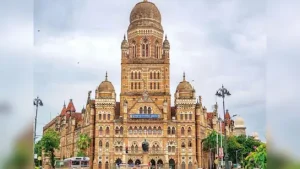BMC linguistic controversy
has become a focal point of heated debates between major political parties. The Congress party has raised serious allegations against the current administration, claiming that the language-based political manoeuvring represents a calculated strategy designed to influence the upcoming Mumbai civic elections.
The BMC linguistic controversy has prompted strong reactions from the Congress party, which has accused Chief Minister Fadnavis of orchestrating what they describe as a deliberate “trap” aimed at consolidating Hindi-speaking voters in Mumbai. According to Congress leadership, this controversy over Marathi versus Hindi language politics is not a spontaneous development but rather a carefully planned political strategy designed to benefit the Bharatiya Janata Party (BJP) in the approaching civic body elections.
The allegations suggest that the BMC linguistic controversy serves as a diversionary tactic, potentially shifting public attention away from pressing governance issues while simultaneously creating linguistic divisions that could be exploited for electoral gains. Congress representatives have characterised this approach as manipulative, arguing that language should unite communities rather than divide them for political advantage.
 Mumbai’s linguistic landscape has always been complex, with both Marathi and Hindi speakers forming significant portions of the city’s population. The current BMC linguistic controversy draws upon decades of language-related tensions that have periodically surfaced in Maharashtra’s political discourse. The Brihanmumbai Municipal Corporation, being one of India’s largest civic bodies, naturally becomes a battleground for such linguistic and cultural debates.
Mumbai’s linguistic landscape has always been complex, with both Marathi and Hindi speakers forming significant portions of the city’s population. The current BMC linguistic controversy draws upon decades of language-related tensions that have periodically surfaced in Maharashtra’s political discourse. The Brihanmumbai Municipal Corporation, being one of India’s largest civic bodies, naturally becomes a battleground for such linguistic and cultural debates.
The controversy reflects broader questions about cultural identity, regional pride, and the accommodation of diverse linguistic communities within Mumbai’s cosmopolitan framework. Previous instances of language-based political mobilisation in Maharashtra have demonstrated the potential for such issues to significantly influence electoral outcomes, making the current BMC linguistic controversy particularly significant for all stakeholders involved.
According to Congress’s allegations, the BMC linguistic controversy represents a sophisticated electoral strategy designed to appeal specifically to Hindi-speaking voters in Mumbai. This demographic constitutes a substantial portion of the city’s electorate, particularly in certain constituencies where their voting preferences could determine election outcomes.
Kindly also read: Update on the Honey Trap Case
The Congress party suggests that by positioning itself as protective of Hindi speakers’ interests while simultaneously managing Marathi language concerns, the BJP aims to create a winning coalition for the Mumbai civic elections. This alleged strategy involves carefully calibrated messaging that appeals to different linguistic communities while avoiding confrontation that could alienate either group entirely.
The BMC linguistic controversy thus becomes a tool for demographic mobilization, allowing the ruling party to segment the electorate based on linguistic preferences and tailor specific appeals to each community. Critics argue that this approach prioritizes electoral calculations over genuine cultural sensitivity and inclusive governance.
The ongoing BMC linguistic controversy extends beyond mere electoral politics to affect the actual functioning of Mumbai’s civic administration. Questions arise about language policies in municipal offices, the medium of instruction in civic communications, and the cultural representation within the municipal corporation’s operations.
These governance implications make the BMC linguistic controversy more than just campaign rhetoric, as the outcomes could influence how the city’s largest civic body operates and serves its diverse population. The controversy touches upon fundamental questions about linguistic rights, cultural accommodation, and the practical challenges of governing a multilingual metropolis.
Municipal services, public communications, and civic engagement could all be affected by the resolution of this linguistic debate, making it a substantive governance issue rather than merely a political talking point.
The BMC linguistic controversy has generated responses from various political quarters, with different parties positioning themselves strategically on the language question. While Congress has framed the issue as BJP manipulation, other political actors have offered their interpretations of the controversy’s significance and implications.
Regional parties with strong Marathi identity have weighed in on the BMC linguistic controversy, adding complexity to the political dynamics. Their involvement transforms what might have been a bilateral Congress-BJP dispute into a multi-party debate with broader implications for Maharashtra’s political landscape.
The controversy has also attracted attention from cultural organisations, linguistic advocacy groups, and civil society actors who view the BMC linguistic controversy through different lenses than purely electoral ones.
As Mumbai approaches its civic elections, the BMC linguistic controversy appears likely to influence campaign strategies, voter mobilisation efforts, and coalition-building among political parties. The controversy’s timing suggests its potential impact on electoral preparations and candidate selection processes.
And for other BMC-related news, kindly check: BMC Property Tax
Vote bank calculations related to linguistic communities could become central to party strategies, with the BMC linguistic controversy serving as both a rallying point and a potential source of division among Mumbai’s electorate. The ability of different parties to navigate these linguistic sensitivities while advancing their electoral interests will likely determine their success in the civic polls.
The BMC linguistic controversy represents a significant development in Mumbai’s political landscape, combining cultural sensitivities with electoral calculations in ways that could reshape the city’s civic governance. As allegations and counter-allegations continue, the ultimate resolution of this controversy will likely influence not only the immediate electoral outcomes but also the longer-term approach to linguistic diversity in Mumbai’s municipal administration.
The controversy underscores the complex intersection of language, politics, and governance in India’s commercial capital, highlighting the ongoing challenges of managing linguistic diversity within democratic frameworks while maintaining social harmony and effective civic administration.
Chat controls

